
by DharamCW | Sep 26, 2024 | Leadership in Project Management
Project management is becoming an essential component of modern business operations. Organizations increasingly use project management to monitor and assess projects and ensure they meet their objectives. Project management entails several complex processes, including project planning, organization, management, control, budgeting, monitoring, testing, and implementation.
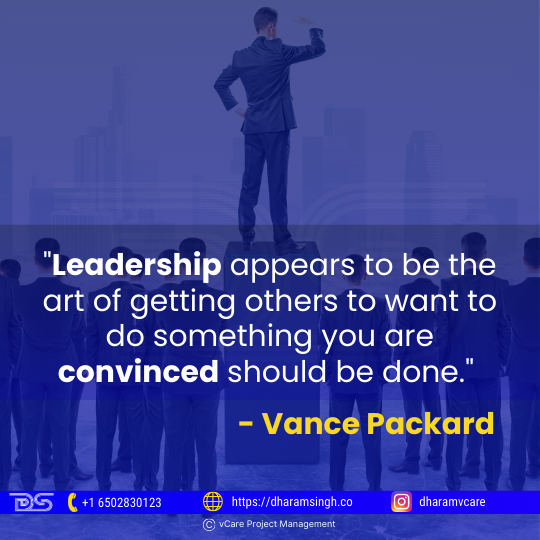
Vance Packard Quote
Project leadership is the art and science of guiding a team to successful project completion. When project leadership brings people together to work toward a similar objective, the team can do more than they could individually.
Project Management Leadership
Leadership in project management is a necessary ability for completing the project. Like in other business areas, leadership necessitates demonstrating several talents and behaviors in a project context. Leadership is essential to ensure the success of the projects, from team leadership to project governance.
Leadership and project management are closely intertwined. Setting the vision and encouraging the team to work together to accomplish the project goal are vital components of leadership. In a project environment, this is particularly significant. Delivering any project requires a team effort. While some teams work without a clear leader, in business, it is customary for someone to be in the leadership role, guiding and directing the team toward their goals. On the other hand, project management systematically applies processes, methods, knowledge, skills, and experience to achieve the project objectives. Effective project management often requires strong leadership to guide the team through the project’s complexities and challenges.
5 Essential Project Leadership Skills
Project managers execute allocated project tasks through their project teams. They learn the technical, business, and leadership skills to manage their project teams effectively. In addition, they use strong leadership skills to motivate their teams to complete project deliverables and achieve project goals.
Project managers’ essential leadership skills begin with encouraging and inspiring their teams. However, the five critical project leadership skills are equally vital in enhancing team performance.
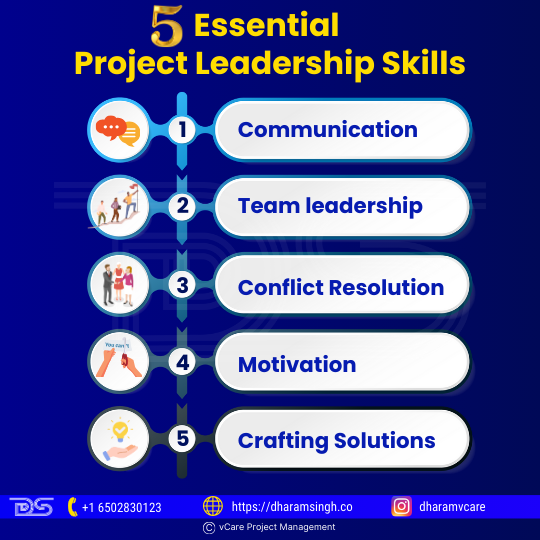
5 Essential Project Leadership Skills
- Communication
One of the most important project management skills is communication. Leaders must communicate effectively because a significant portion of their work includes collaboration. If you can communicate, you can collaborate properly.
Leaders can communicate ideas to people and groups in person, over the phone, or via web conferencing. They can also present their ideas to ensure the message is shared and understood. However, communication is more than just passing on messages and conversing with people. Communication is one of the most important characteristics of a project manager, especially in a leadership role.
- Team leadership
The leader establishes the vision and motivates others. Someone with outstanding project leadership skills fosters team agreement and togetherness while managing day-to-day operations.
Team leadership on projects entails establishing an environment in which everyone may thrive. People are lured to the project culture that surrounds them. Stakeholders want to be part of the project because they know you will complete the task while creating a pleasant working environment.
- Conflict resolution
Conflict is unavoidable when introducing or modifying something. However, effective leaders understand how to use conflict to their advantage since the finest solutions emerge when ideas are challenged.
Conflict may benefit teams by allowing all voices to be heard and opposing viewpoints to be expressed, frequently resulting in a better solution and more successful project outcomes. However, leaders must be equipped with conflict resolution skills to recognize and address conflict before it becomes a problem for the team. Therefore, another crucial core competency of project management is dealing with conflict in various ways.
- Motivation
Leaders motivate others to act even when they are not technically in charge. As a project manager, one determines what makes the other team members feel they’re giving their best. The project leader should do their best to deliver this. Everyone is driven differently, and motivation changes over time. Great leaders see these disparities and establish a great work environment to enable their workers to achieve their full potential.
- Crafting solutions
Empowering the team and the larger stakeholder community to participate in developing solutions is part of fostering a positive working culture. That entails removing roadblocks so that each team member may fulfill their work and contribute new ideas without concern about something getting in the way.
Empowering leaders also allows them to make decisions down the hierarchy to the lowest feasible level, allowing specialists to judge the solutions required to keep the project going. This empowerment fosters a positive working culture and inspires team members to take ownership of their work and contribute to the project’s success.
Leadership Styles and Theories
There is no single style to leadership, nor is there a particular type of person who makes a great leader. Instead, according to project leadership theory, a great leader is a mix of traits and the capacity to adapt to diverse conditions. This adaptability reassures individuals that leadership is not a fixed trait but a skill that can be developed and enhanced.
Leadership is something one can learn, and one can enhance one’s talents by understanding leadership theories in management. The three basic leadership theory categories that apply to project delivery are:
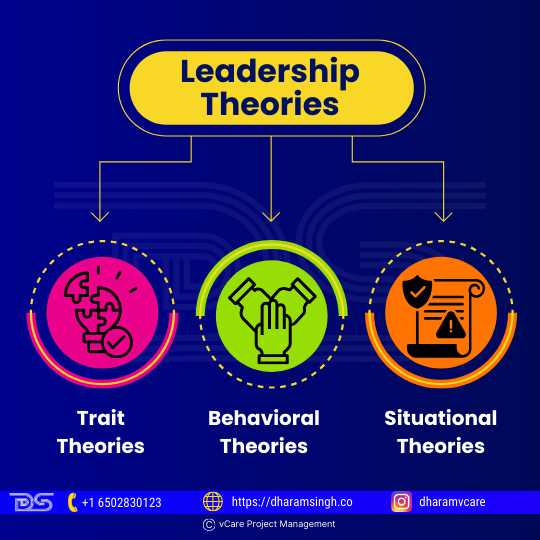
Leadership Theories
- Trait theories
Project manager strengths are related to trait theories. This perspective on leadership identifies the abilities and attributes that are beneficial while leading a team. Resilience, honesty, trustworthiness, aggressiveness, and so on are examples.
There was a system of thinking that stated certain characteristics were innate and that you were either born with them or not. Fortunately, this notion is no longer present in leadership concepts and theories. We know that an individual can act to become more aggressive and resilient or develop any other leadership trait.
- Behavioral theories
Behavioral leadership theories concern what a leader does. For example, some Corporate leaders are dictatorial and make decisions without consulting their employees. Others are more collaborative, inviting feedback and empowering their employees.
Both strategies are acceptable, and any combination of the two. However, there is a time and place for every style: you wouldn’t expect a combat leader to order a huddle so the team could discuss possibilities, would you? In that case, a choice must be taken immediately. Thus, a collaborative, listening leadership style would better engage the community.
- Situational theories
Situational leadership is deciding which leadership style to employ in any given scenario. These leadership theories are often known as contingency theories.
They analyze whether using a task-based or a people-based approach is more effective. They also take into account the individuals you lead. What type of encouragement and support do they require? A leader tailors their leadership style to the demands of the team, the business environment, and project circumstances. Someone who has never done specific work before will require more hands-on assistance from their team leader than someone confident in completing that activity.
Project Management Leadership Styles
Leadership in project management is essential for success. A project is a substantial and necessary endeavor in any business organization that requires full concentration and dedication from all participants. The success or failure of any business project can influence the company’s path. Project management is a critical role that may be entrusted to anybody, especially in today’s technology-driven business environment, where change is inescapable.
The ultimate success of every project is determined by project leaders, who have the authority to manage and oversee all project activities and make critical project choices. Similarly, failure to accomplish project objectives is the responsibility of the project’s leaders or management. Failure or inability to use the authority conferred upon them to ensure the project’s success is regarded as a point of accountability.
It is important to note that any project a firm does should strive to achieve certain goals that will enhance business operations and increase profitability, performance, output, and overall success in its objectives. As a result, project management is a critical function that leaders and anybody charged with project leadership must take seriously and utilize their effective leadership skills to ensure success.
Here are the six important project management leadership styles.
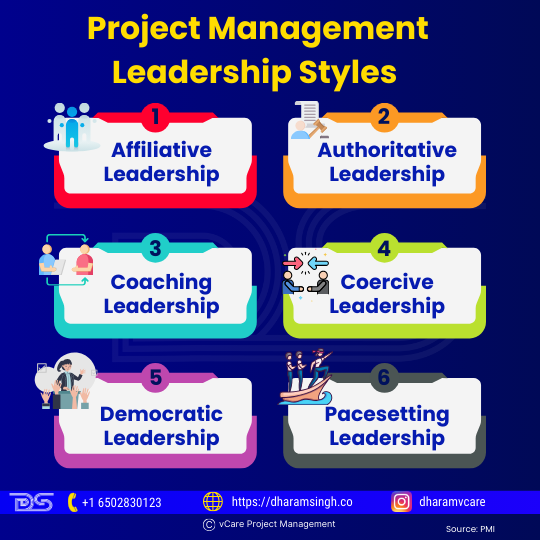
Project Management Leadership Styles
- Affiliative Leadership
This leadership style has a positive impact on a project team. This leader aims to create emotional bonds inside the organization to generate a sense of belonging and connection. When teammates require personal assistance or the team has to rebuild trust, the affiliative strategy is most successful. Because a single focus on praising and nurturing may result in poor performance and a lack of direction, this strategy should be used in various ways.
- Authoritative Leadership
Authoritarian leaders generate an entrepreneurial spirit and a strong devotion to the cause. Moreover, the traditional method works effectively when the team needs a new vision owing to changing circumstances or when clear guidance is unnecessary. Therefore, more utilization of this style would result in better project team outcomes without negative consequences, as this style has a generally positive effect throughout the organization.
- Coaching Leadership
This project management approach encourages team members to expand their capacity and capability as project contributors, which benefits the whole project team. This approach is the most effective coaching technique when a leader wants to assist colleagues in creating long-term personal characteristics that will help them succeed. However, it falls short when teammates are relentless about staying the same or learning or when the leader needs more aptitude.
- Coercive Leadership
Project managers rarely use this tactic, which would be more evident in times of crisis, such as when a project deadline was approaching and at risk of being missed.
- Democratic Leadership
This leader achieves successful compromises through teamwork. In a PMO, for example, each team member contributes to defining and measuring the PMO’s objectives. When the leader wants the team to buy into or own a decision, strategy, or goal, or when they are unsure and need new ideas from competent colleagues, the democratic method works well.
- Pacesetting Leadership
This leader anticipates self-management. The pacesetting approach works most effectively when the team is already motivated and talented and the leader demands quick results. This approach is popular, especially when a project nears major milestones. Although this method generally harms project teams, it can be beneficial in some situations.
Impact of Good Leadership on a Project
Many studies have highlighted leadership as one of the key reasons for project failure. On the other hand, projects with strong leadership and organizational support outperform those without.
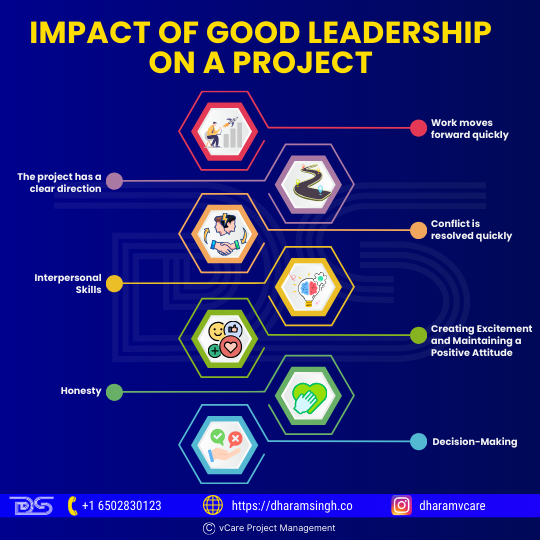
Impact of Good Leaders on a Project
- Work moves forward quickly
When an individual actively leads, the work proceeds quickly as the choices are made on time. This move allows the project to be completed on schedule while delivering all planned project scope elements.
- The project has a clear direction
A leader ensures that the team knows and supports a common goal. A clear direction gives context for decision-making and ensures that everyone knows what the project will deliver.
- Conflict is resolved quickly
The project leader is constantly looking for conflict and can intervene to handle it before it escalates into a crisis.
- Interpersonal Skills
Project leaders must have interpersonal skills such as questioning, listening, and speaking to establish successful and compelling interactions with team members.
Experts in project management believe that projects are more likely to fail if project managers lack excellent interpersonal skills. Because much of a project manager’s duties involve communicating with stakeholders, one must have great interpersonal skills to lead from the front.
- Creating Excitement and Maintaining a Positive Attitude
The most crucial project manager leadership skills are boosting team members’ enthusiasm and displaying an optimistic attitude, especially in times of crisis. In addition, project management and leadership are about instilling trust in teams that there will always be a solution, no matter how serious a situation is.
- Honesty
When defining ethical guidelines and supporting transparency in communication, project manager leadership skills should embrace honesty.
Honesty and integrity are two fundamental traits of project management leadership that project managers should cultivate to increase trust among customers, members, management, and other stakeholders.
- Decision-Making
The project manager has the last say in simplifying processes and solving difficulties. As a result, the project manager’s capacity to make informed judgments is a critical function of leadership in project management.
Decision-making is an important project manager leadership skill that directly influences project outcomes. Therefore, to advance in their careers, all prospective project management professionals must master decision-making abilities.
Leadership mindsets are driving the new economy
Mindsets are mental maps that reflect and govern how individuals act in organizations. They convey how individuals work and what they stand for. So, what leadership characteristics do respondents and experts believe are necessary for success in the digital economy? World Economic Forum survey data states four leadership mindsets driving the new economy: producers, investors, connectors, and explorers.
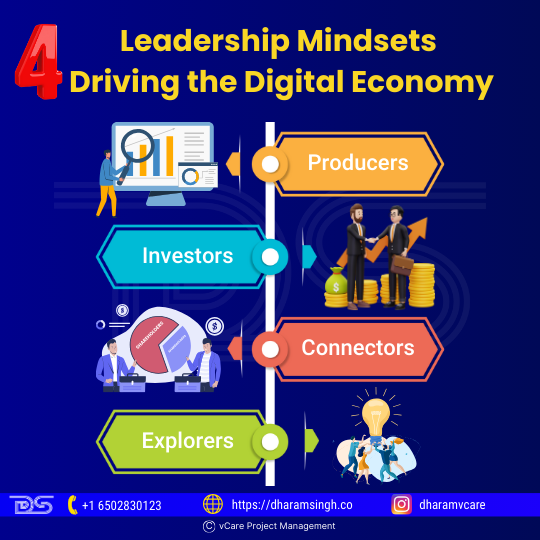
Leadership Mindsets Driving the Digital Economy
- Producers
The producers’ mindset blends with creating consumer value, emphasizing analytics, digital savvy, execution, and outcomes. Producers use analytics to expedite innovation that addresses shifts in customer preferences and enhances customer and user experiences.
- Investors
Leaders with an investor mindset seek a purpose for their firm beyond improving shareholder returns. They are committed to growth but in a sustainable way. They are concerned about the areas in which they operate, their personnel’s welfare, and ongoing development. They focus on increasing the value of their clients rather than treating them as money sources.
- Connectors
Leaders with a connector’s mindset see that mastering connections and networks is the new currency driving corporate performance in the new economy. Connectors understand this fundamentally. It’s how they work. They constantly bring various stakeholders from within the organization and ecosystem partners together. Connectors recognize the importance of building a feeling of community and belonging, which is especially vital in today’s fast-paced, breakneck-speed world when losing contact with the human touch is too easy.
- Explorers
Leaders with an explorer’s mindset are curious and innovative and thrive on ambiguity. They constantly experiment and learn by listening to a wide range of voices. Establishing behavioral standards encouraging risk-taking and failure, reverse mentorship, and a deep curiosity about how new forces shape the competitive environment are strong indicators of an explorer’s attitude.
Final Thoughts
Project management is a demanding task requiring effective leadership styles and traits for the project’s overall success. Successful project leadership involves team building, adaptability, communication, and effective planning skills. As a result, leaders play a fundamental and crucial role in project management since their approach decides whether a project will succeed or fail.
Project management is different from leadership. Successful project managers may need to be more effective leaders. However, they can learn leadership qualities and become successful leaders. In today’s firms, competent project managers must also be strong leaders. Successful project managers may use their innovative and creative capabilities to assist them in acquiring leadership skills that will complement their project management abilities by recognizing the difference between project management and leadership and adopting the road to becoming influential leaders.
The common component of project management and leadership is the standard by which the project manager and leader’s performance is judged. A project manager’s success and a leader’s effectiveness are evaluated in terms of the performance of the followers—the team’s performance. As a result, improving project managers’ leadership skills with an emphasis on abilities to increase team performance should be a key factor.
Leadership is critical in project management and must be balanced. It impacts project success and the value offered to the organization. The good news is that the finest project management training incorporates leadership concepts, providing employees with a well-rounded understanding of what it takes to lead a project.
With advanced certifications like PMP®, Agile, PgMP®, and PfMP® certifications, one can develop project management skills, be a good problem solver, be a more competitive candidate for positions, and be a successful project leader. In today’s competitive business world, one must be skilled and experienced to succeed and grow their career.

by Dharam CW2 | Mar 15, 2024 | General
Managers who practice both strong management and effective leadership skills are successful project managers. Management skills are different from leadership skills. Effective leaders develop new leadership skills to enhance the ones that help them succeed as managers.
Organizations require effective leaders to achieve their strategic goals through programs and initiatives. Therefore, organizations need successful project/program managers who are also effective leaders. But what kind of leadership skills do project managers require? Are project management skills insufficient?
Project management differs from leadership. However, although project management differs from leadership, the two have some similarities. For instance, the performance of a project manager and the leader’s efficacy are both judged in terms of the performance of the followers—the team’s performance. As a result, focusing on team performance is a critical component of building project managers’ leadership skills.
Leadership Effectiveness

Leadership Effectiveness
On a macro level, leadership effectiveness is defined by a leader’s ability to gain support and influence throughout an organization to guarantee that everyone is going in the same direction to achieve common goals. It effectively measures a leader’s ability to lead, influence, manage, advice, and build their team members. The total growth and performance of the teams may be used to assess leadership effectiveness. Those who report high levels of productivity, performance, employee happiness, and well-being indicate high levels of leadership effectiveness.
A good leader inspires the best in others. These leaders understand how to create the ideal corporate vision, establish the proper values, and assist employees in focusing on and improving their skills. Great leadership reflects great performance, not just complex numbers. Workers and the organization will improve if leaders establish a great corporate culture and help employees thrive.
Program management
According to the Standard of Program Management – Fourth Edition, Program management is “the application of knowledge, skills, and principles to a program to achieve the program objectives and to obtain benefits and control not available by managing program components individually.” Program management involves aligning program components to ensure goals are achieved and benefits are optimally delivered. Program management is performed by a program manager authorized by the organization to lead the team(s) responsible for achieving program goals and objectives.
Ways to improve leadership effectiveness in Program Management

Ways to improve leadership effectiveness in Program Management
- Ensure clarity and visibility of goals
You may begin your path to improve leadership effectiveness in your business by encouraging leaders, managers, and executives to focus on objective clarity and visibility. This move has multiple aspects. First and foremost, the goals must be very clear. As a result, goals must be SMART for effective leadership, and adopting an OKR approach will make sense.
Second, for comprehensive visibility, the goals must be communicated to everybody. On the one hand, everyone in the team has to understand the organization’s goals and their role in attaining them.
- Facilitate accountability and responsibility
Second, exercising accountability and responsibility is critical for leadership success. Encourage your leaders to take accountability for their actions. The goal is to encourage them to be interested in increasing their leadership effectiveness. This aspect requires determining which skills and abilities to be acquired, as well as aspects such as emotional intelligence and empathy. When your leaders seek to improve themselves, they usually set a good example for others to follow, increasing their effectiveness as leaders since they may start a positive trend.
- Create a culture of feedback
Leadership effectiveness is heavily influenced by a leader’s desire to improve oneself. It is optional to self-assess the deficiencies and work on upskilling in this situation. Instead, it is critical to foster a feedback culture. First and foremost, it is vital to provide feedback to employees on their performance and to assist them in improving and growing along the way. This move will immediately influence organizational goals and define increased effectiveness.
Second, encourage your leaders to be receptive to employee input as well which will assist them in seeing and comprehending the gaps in their leadership style that may impede their success as a leader. Creating a feedback culture can promote improved outcomes, eventually enhancing leadership effectiveness.
- Build trust and transparency
Trust and openness are required for leaders to influence, direct, and build their teams to success. When employees trust their supervisors or leaders, they will follow them fully and offer their all. If not, following their manager will be a pointless exercise limiting leadership effectiveness.
Similarly, it is critical to be open and honest with all employees. Secrets, nepotism, preferences, and biases will be self-defeating if you want your leaders to inspire everyone collectively. Instead, everyone must be treated equitably, and all processes must be transparent to acquire team trust and influence them.
- Focus on continuous performance management
Effective leadership is not just about motivating and encouraging team members to follow a leader or manager but also about doing so in a way that leads to achieving a certain objective or high level of performance. As a result, boosting leadership effectiveness necessitates emphasizing continuous performance management.
Employees grow and develop when their leaders or managers regularly monitor and track employee performance and give frequent interventions and corrective steps to minimize risks or problems. As a result, they can motivate and inspire their team members, resulting in increased leadership effectiveness.
- Respect differences and promote inclusion
Members of each team come from various backgrounds, bringing with them different perspectives, ideas, and opinions. An effective leader accepts these differences, appreciates them, and recognizes their value. To boost leadership effectiveness, you must cultivate an inclusive culture. In addition, your leaders must understand the important skills and competencies each team member brings to the table and how the multiple views and perspectives offer the ideal breeding environment for creativity and success, resulting in leadership effectiveness.
- Foster a growth mindset
The last recommended practice for increasing leadership effectiveness is cultivating a growth mindset. It would be best to encourage your leaders to have a growth mindset during all interactions or choices they make. For example, when dealing with a team member, they must keep the employee’s personal and professional development in mind. Likewise, when making a strategic choice, they must link it with the organization’s goals and how it will eventually contribute to its success. With a development mentality, your leaders will guarantee that they lead effectively, strategically, and in the greatest way possible.
Leadership in Project Management
Leadership in project management is a vital ability for completing the project effectively. Leadership in a project setting, like leadership in other areas of business, necessitates demonstrating many talents and behaviors. Leadership is essential to ensure your initiatives’ success, from team direction to project governance.
Leadership and project management go hand in hand. You oversee the project and lead the team as the project lead. Setting the vision and encouraging the team to work together to accomplish it is a vital component of leadership. You can see how significant that is in a project environment. Delivering any project requires a team effort. While some teams work without a clear leader, in today’s business, it is more customary for someone to be in the leadership role, guiding and directing the team toward their goals.
5 Essential Project Leadership Skills
Influential leaders draw on many essential project management skills and competencies. The top five project management leadership skills are:

5 Essential Project Leadership Skills
- Communication
One of the essential project management characteristics is communication skills. Communication skills are essential for project leaders since their job requires collaboration. You can only collaborate efficiently if you can communicate clearly. Leaders can communicate ideas to people and groups in person, over the phone, or through other modes of communication. Therefore, communication is one of the most important abilities of a program manager, especially in a leadership role.
- Team leadership
The leader establishes the vision. They motivate others around them. Someone with outstanding project leadership skills fosters team agreement and togetherness while managing day-to-day team activities.
Team leadership on projects entails establishing an atmosphere in which everyone may thrive. People are drawn to the project culture that surrounds them. Stakeholders want to participate in the project because they know you will complete the task while creating a pleasant working environment.
- Motivation
Leaders inspire people to act even when they are not technically in control. As a program manager, you figure out what makes the other team members feel like they’re doing their best, and you do your best to deliver it to them.
Everyone is driven differently, and a person’s motivation can shift over time. Great leaders realize these distinctions and enable their employees to accomplish their best by fostering a happy work environment.
- Crafting solutions
Empowering the team and the larger stakeholder community to participate in developing solutions is part of fostering a positive working culture. That entails removing obstacles so each team member may fulfill their work and contribute new ideas without worrying about something getting in the way. Empowering leaders will also drive decisions down the hierarchy to the lowest possible level, allowing specialists to judge the solutions required to keep the project going.
- Conflict resolution
Conflict is inevitable when introducing or altering anything. However, effective leaders understand how to use conflict for good since the finest solutions emerge when ideas are challenged.
Conflict may benefit teams because it allows all voices to be heard and opposing viewpoints to be expressed, frequently leading to a better solution and more effective project outcomes. However, leaders must be prepared with conflict resolution tactics to recognize and address conflict before it becomes a problem for the team.
The Challenges of Leadership Effectiveness

The Challenges of Leadership Effectiveness
- Development of managerial effectiveness
To improve their leadership effectiveness, project leaders must acquire the following skills:
- Time management
- Task prioritization
- Strategic thinking
- Goal-setting ability
- Good judgment
These are essential skills for a project leader to deliver effective projects and handle the possibly competing demands of many duties. Without them, a leader is more prone to burnout from focusing on irrelevant matters and achieving little of the planned tasks and objectives.
- Inspiring and Motivating the Workforce
Motivating and inspiring others to follow you and act in a specific manner is a skill that some people appear to be born with, and others must learn. However, whether you have an inherent talent for motivating others or not, it is a skill that every project leader must have to motivate their worldwide workforce.
Passion is an important aspect of inspiring and encouraging people. Passionate leaders ignite the fire in their team members, allowing innovation to flourish and encouraging everyone to participate. In addition, effective leaders can naturally share and correctly convey their team’s and stakeholders’ enthusiasm and drive.
- Developing Employees and the Rise of “Servant Leadership.”
“Servant leadership” is based on the idea that leaders should not just delegate responsibilities but also consider themselves servants of the people they manage. As a result, their actions are driven by what is best for their team or workers rather than by what is best for themselves, which might manifest itself in the following ways:
- Close collaboration between management structures and employees
- Active participation in the growth of their teams
- Leading by example and embodying the ideals that leaders want to see in their team dynamics
- Using value systems to motivate teams to act rather than spreading fear
- This managerial style is infused with sincerity and humility.
A project leader who can find a balance between the servant-leader management style and more antiquated, authoritarian methods will be able to inspire and encourage their workforce.
- Leading a Team
All diverse cultures and viewpoints must cooperate and contribute to leading a project team effectively. Whether forming a new team or taking over an existing one, leaders must be able to give the support their team requires to cope with and navigate change or to create something entirely new.
Determining the sort of assistance required might take time and effort. Teams are as distinct as the individuals that comprise them. Project leaders must be extremely attentive to detect the demands of their workforce. What works for one person may not work for another. Leaders must be able to modify their management style in response to the demands of their teams.
Final Thoughts
In today’s firms, competent project managers must also be effective leaders. Therefore, successful project managers may use their inventive and creative skills to assist them in acquiring leadership skills that will complement their project management skills by recognizing the difference between project management and leadership and adopting the roadmap to becoming effective leaders.
The shared component of project management and leadership is the yardstick by which the performance of the project manager and the leader is measured. The performance of a project manager and the efficacy of a leader are both judged in terms of the performance of the followers, i.e., the team’s performance.
As a result, improving leadership skills for project managers with an emphasis on skills to increase team performance should be an essential factor in the project management leadership skill development process. Project managers’ essential leadership skills begin with motivating and inspiring teams and individuals. These aspects can be developed via negotiation and communication, listening and influencing, and team-building skills, emphasizing leveraging these talents to improve overall team performance.
For any questions related to your Project Management career, training, and certifications, you can book an obligation free 15 minutes session with me by visiting https://bit.ly/2SbhTOK
You can subscribe to the vCare Project Management YouTube Channel to catch future videos of our Q&A series and certification success stories: https://bit.ly/2YF0wJl
You can subscribe to and follow my podcasts and interviews with Project Management Experts on YouTube at https://bit.ly/2NDY8wd
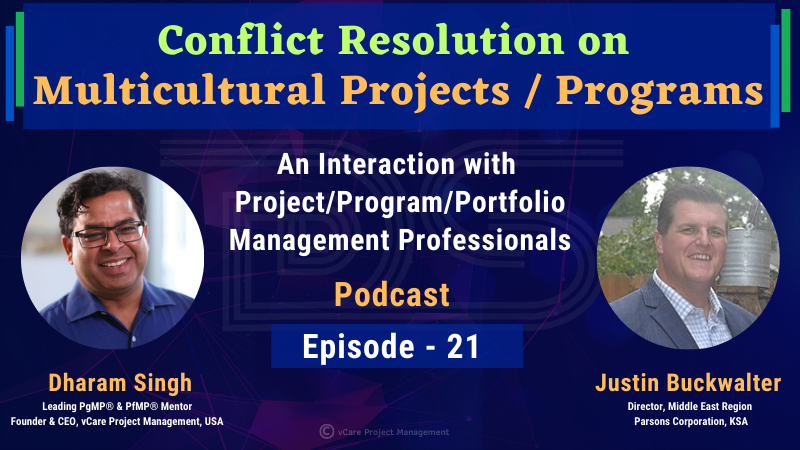









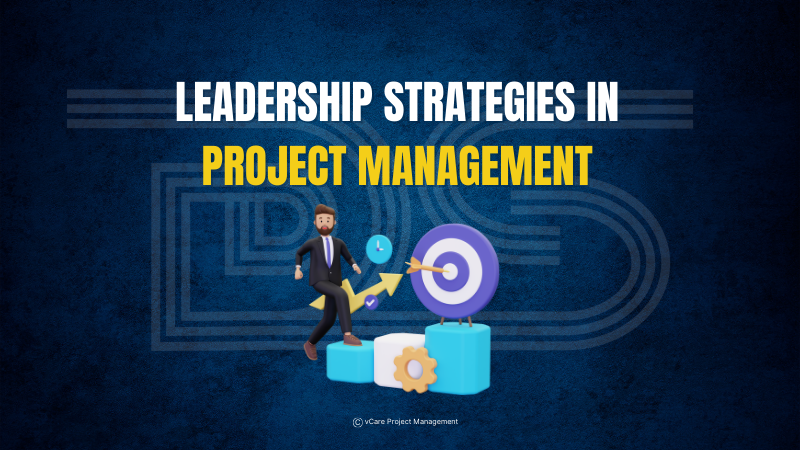
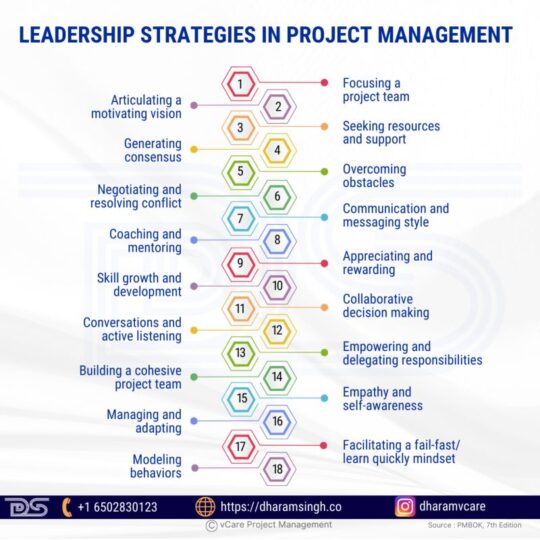







Leadership plays a crucial role in the success of a project. In Project Management, effective leadership is essential for achieving positive outcomes. The PMBOK 7th Edition highlights various strategies that can improve leadership skills within a project team. Emphasizing skills such as focusing on agreed-upon goals, articulating motivating visions, and fostering collaboration is vital for overcoming obstacles and driving progress. From conflict resolution to promoting self-awareness, every aspect of leadership contributes to a cohesive team and project success.